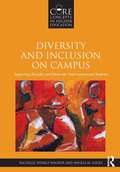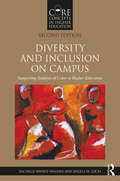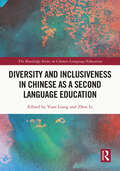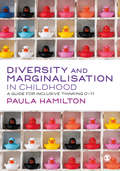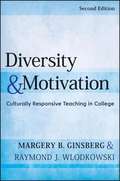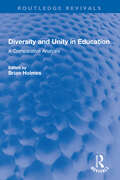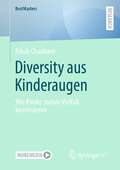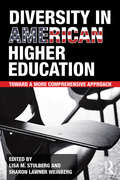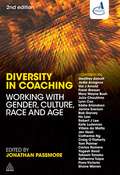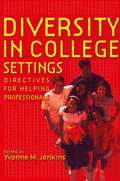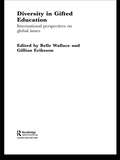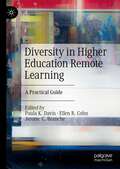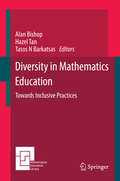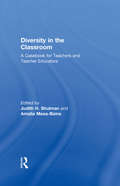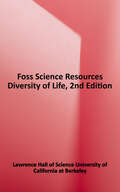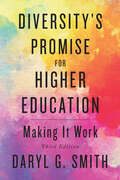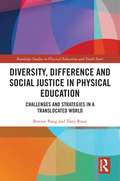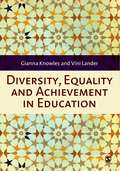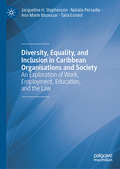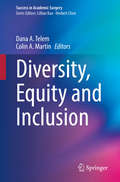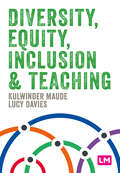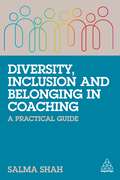- Table View
- List View
Diversity and Inclusion on Campus: Supporting Racially and Ethnically Underrepresented Students (Core Concepts in Higher Education)
by Angela M. Locks Rachelle Winkle-WagnerAs scholars and practitioners in higher education attempt to embrace and lead diversity efforts, it is imperative that they have an understanding of the issues that affect historically underrepresented students. Using an intersectional approach that connects the categories of race, class, and gender, Diversity and Inclusion on Campus comprehensively covers the range of college experiences, from gaining access to higher education to successfully persisting through degree programs. Authors Winkle-Wagner and Locks bridge research, theory, and practice related to the ways that peers, faculty, administrators, and institutions can and do influence racially and ethnically underrepresented students' experiences. This book is an invaluable resource for future and current higher education and student affairs practitioners working toward full inclusion and participation for all students in higher education. Special features: Chapter Case Studies--cases written by on-the-ground practitioners help readers make meaningful connections between theory, research, and practice. Coverage of Theory and Research--each chapter provides a systematic treatment of the literature and research related to underrepresented students' experiences of getting into college, getting through college, and getting out of college. Discussion Questions--questions encourage practitioners and researchers to explore concepts in more depth, consider best practices, and make connections to their own contexts.
Diversity and Inclusion on Campus: Supporting Students of Color in Higher Education (Core Concepts in Higher Education)
by Angela M. Locks Rachelle Winkle-WagnerThis new and updated second edition of Diversity and Inclusion on Campus: Supporting Students of Color in Higher Education provides an exploration of the range of college experiences, from gaining access to higher education to successfully persisting through degree programs. By bridging research, theory, and practice related to the ways that peers, faculty, administrators, staff, and institutions can and do influence racially and ethnically diverse students’ experiences, Winkle-Wagner and Locks examine how and why it is imperative to have an understanding of the issues that affect students of color in higher education. This new edition also includes features such as: New case studies and examples throughout that allow readers to take institutional-level and student-level approaches to the chapter topics Updated citations and theory across chapters New topical coverage, including discussion of college affordability, an exploration of a variety of institution types, and the role of merit in maintaining and perpetuating racial inequality in higher education End-of-chapter questions that encourage readers to explore chapter concepts in more detail This second edition is an invaluable resource for future and current higher education and student affairs practitioners working towards full inclusion and participation for students of color in higher education.
Diversity and Inclusiveness in Chinese as a Second Language Education (The Routledge Series on Chinese Language Education)
by Zhen LiThis edited volume represents a collaborative effort from over 20 authors worldwide, who generously shared their expertise and insights on diversity and inclusiveness in Chinese as a Second Language (CSL) education. It critically examines a wide range of acquisitional, curricular, and pedagogical issues related to inclusive practices in diverse CSL educational settings across various geographical contexts, including mainland China, Hong Kong, Taiwan, Singapore, Vietnam, the United Kingdom, and Australia. It focuses on students with varied linguistic, ethnic, and cultural backgrounds and learning abilities, drawing on a comprehensive collection of original empirical studies.The book is structured into two parts. Part I addresses research on linguistic and learner diversity in CSL education by exploring the challenges faced by different types of CSL learners, acquisition strategies, and assessment methods. Part II delves into the practical implementation of inclusivity in curriculum design and pedagogical practices across diverse CSL teaching contexts.The book offers a research-informed understanding of diversity in CSL education, promoting inclusive teaching practices and methods to effectively engage learners of all backgrounds. CSL practitioners, educators, leaders, curriculum designers, and researchers will find this book to be a useful resource for supporting their research and practice.
Diversity and Marginalisation in Childhood: A Guide for Inclusive Thinking 0-11
by Paula HamiltonThis core text offers you an accessible foundation to the topics of diversity, inclusion and marginalisation. Not only will you develop an understanding of how marginalisation happens, you will be encouraged to question and challenge policy and practice through case studies, reflective questions and activities. The book analyses issues encountered by marginalised groups and the impact these may have on the lives of those concerned, together with how you, as a practitioner, can help to empower these individuals and groups. With key chapters bringing attention to less cited marginalised groups such as transgender children, children with mental health conditions and looked after children, the author critically analyses the difficulties and challenges of inclusive ideology in practice, the role of mass media in reinforcing prejudice and examines theoretical frameworks and concepts related to marginalisation, inclusion and diversity.
Diversity and Marginalisation in Childhood: A Guide for Inclusive Thinking 0-11
by Paula HamiltonThis core text offers you an accessible foundation to the topics of diversity, inclusion and marginalisation. Not only will you develop an understanding of how marginalisation happens, you will be encouraged to question and challenge policy and practice through case studies, reflective questions and activities. The book analyses issues encountered by marginalised groups and the impact these may have on the lives of those concerned, together with how you, as a practitioner, can help to empower these individuals and groups. With key chapters bringing attention to less cited marginalised groups such as transgender children, children with mental health conditions and looked after children, the author critically analyses the difficulties and challenges of inclusive ideology in practice, the role of mass media in reinforcing prejudice and examines theoretical frameworks and concepts related to marginalisation, inclusion and diversity.
Diversity and Motivation
by Raymond J. Wlodkowski Margery B. GinsbergWhen the first edition of Diversity and Motivation was published in 1995, it became a premier resource for faculty and administrators seeking effective and practical strategies that foster motivation among culturally diverse student groups. This revised and updated second edition of Diversity and Motivation offers a comprehensive understanding of teaching methods that promote respect, relevance, engagement, and academic success. Margery B. Ginsberg and Raymond J. Wlodkowski base their insights and concrete suggestions on their experiences and research as college faculty. The book defines norms, illustrates practices, and provides tools to develop four foundational conditions for intrinsically motivated learning: establishing inclusion, developing a positive attitude, enhancing meaning, and engendering competence. The authors provide perspectives on the social justice implications of each condition. Diversity and Motivation includes resources to help educators create a supportive community of learners, facilitate equitable discussions in linguistically diverse classrooms, design engaging lessons, and assess students fairly. The ideas in this book apply across disciplines and include teaching practices that can be easily adapted to a range of postsecondary settings. In addition, the authors include a cohesive approach to syllabus construction, lesson design, and faculty development. This new edition also contains a framework for motivating students outside traditional classroom settings.
Diversity and Unity in Education: A Comparative analysis (Routledge Revivals)
by Brian HolmesFirst published in 1980, Diversity and Unity in Education is the result of a conference set up to analyse criteria of diversity in education, comment on the politics of decision-making where diversity exists, and review in comparative perspective policies within countries and regions which have been designed to achieve educational harmony. Issues associated with the provision of separate education on the basis of sex and intelligence are identified and discussed. The extent to which national and local government officials, teachers and parents should, and do, participate in policy decisions is also analysed. International organisations, research workers and consultants will find the volume valuable for the direction it gives to research studies in education. University teachers of comparative education and those involved in multicultural education will find topics on which further research can be developed and postgraduate teaching can be based. The contributors are all distinguished international educationalists who have devoted their careers to the analysis of multicultural education in a world perspective. They are drawn from east and west Europe, North America, Africa and Latin America.
Diversity aus Kinderaugen: Wie Kinder soziale Vielfalt konstruieren (BestMasters)
by Rihab Chaabane"Das ist alles Mensch!" So beschreibt ein vierjähriger Junge aus einer Münchner Kita die Vielfalt menschlicher Lebensweisen im Interview mit der Autorin. Alter, Geschlecht, Herkunft: So haben wir gelernt, gesellschaftliche Vielfalt zu kategorisieren. Doch wie machen es Kinder? In ihrer Studie setzt sich Rihab Chaabane über 38 bildbasierte Kinder-Interviews mit der Frage auseinander, wie sie soziale Vielfalt wahrnehmen und beschreiben. In den Vergleichen zwischen den Geschlechtern, Kita- und Schulkindern und zwischen zwei verschiedenen Milieus werden auf allen drei Vergleichsebenen Unterschiede festgestellt. Dies macht deutlich, dass Alter, Geschlecht und soziales Milieu sich auf die individuelle Konstruktion von Vielfalt auswirken. Diese Ergebnisse heben nochmals die Wichtigkeit einer früh beginnenden vorurteilsbewussten Pädagogik hervor. Zudem wird aus den Erkenntnissen dieser Studie heraus eine Öffnung der Vielfaltsdiskurse gegenüber neuen Dimensionen befürwortet. Auf diese Weise könnten die von den Kindern (neu) hervorgebrachten Kategorien Einzug in Diversitätskonzepte finden und so neue Betrachtungsebenen ermöglichen.
Diversity in American Higher Education: Toward A More Comprehensive Approach
by Sharon Lawner Weinberg Lisa M. StulbergDiversity has been a focus of higher education policy, law, and scholarship for decades, continually expanding to include not only race, ethnicity and gender, but also socioeconomic status, sexual and political orientation, and more. However, existing collections still tend to focus on a narrow definition of diversity in education, or in relation to singular topics like access to higher education, financial aid, and affirmative action. By contrast, Diversity in American Higher Education captures in one volume the wide range of critical issues that comprise the current discourse on diversity on the college campus in its broadest sense. This edited collection explores: legal perspectives on diversity and affirmative action higher education's relationship to the deeper roots of K-12 equity and access policy, politics, and practice's effects on students, faculty, and staff. Bringing together the leading experts on diversity in higher education scholarship, Diversity in American Higher Education redefines the agenda for diversity as we know it today.
Diversity in American Higher Education: Toward a More Comprehensive Approach
by Sharon Lawner Weinberg Lisa M. StulbergDiversity has been a focus of higher education policy, law, and scholarship for decades, continually expanding to include not only race, ethnicity and gender, but also socioeconomic status, sexual and political orientation, and more. However, existing collections still tend to focus on a narrow definition of diversity in education, or in relation to singular topics like access to higher education, financial aid, and affirmative action. By contrast, Diversity in American Higher Education captures in one volume the wide range of critical issues that comprise the current discourse on diversity on the college campus in its broadest sense. This edited collection explores: legal perspectives on diversity and affirmative action higher education's relationship to the deeper roots of K-12 equity and access policy, politics, and practice's effects on students, faculty, and staff. Bringing together the leading experts on diversity in higher education scholarship, Diversity in American Higher Education redefines the agenda for diversity as we know it today.
Diversity in Coaching
by Jonathan Passmore Association for CoachingDiversity in Coaching explores the impact and implication of difference in coaching. The book looks at how coaches can respond to issues of gender, generational, cultural, national and racial difference. Understanding how diversity impacts upon coaching is a crucial element to coaching effectively in today's diverse society and can give coaches the edge when responding to their coachees need. Written by an international team of coaching professionals, the book provides guidance on understanding diversity and how coaches can adapt coaching styles and techniques to meet individual needs, local demands and cultural preferences.It explores the impact and implication of difference in coaching, providing practical information to help coaches respond effectively to issues of diversity.
Diversity in College Settings: Directives for Helping Professionals
by Yvonne M. JenkinsFirst Published in 1999. Routledge is an imprint of Taylor & Francis, an informa company.
Diversity in Gifted Education: International Perspectives on Global Issues
by Belle Wallace Gillian ErikssonThis timely book brings together experts from around the world to share expertise and best practice to form an eclectic collection of the best approaches for teaching gifted and talented children from different cultures. Each chapter: presents an overview of international perspectives on the issues of multi-cultural and gifted education examines the critical issues related to cultural definitions of giftedness in programming for diverse gifted students presents regional case studies in order to inform practitioners' best practice examines issues of access for gifted students in relation to culture, poverty, race and gender. In addition, details of websites and associations which offer support and advice are also provided, making this book an invaluable resource for academics, researchers, teachers and parents of gifted and talented children.
Diversity in Higher Education Remote Learning: A Practical Guide
by Ellen R. Cohn Jerome C. Branche Paula K. DavisThis book provides fundamental principles of remote instruction and classroom management for diversity. Chapters explore the requisite characteristics of higher education administration and infrastructure that support both online and hybrid learning. It draws on proven practices to help research intensive faculty, instructional and clinical faculty, and adjunct faculty deliver efficient and effective online class construction for today's classrooms.
Diversity in Mathematics Education
by Alan Bishop Hazel Tan Tasos N BarkatsasThis book presents a research focus on diversity and inclusivity in mathematics education. The challenge of diversity, largely in terms of student profiles or contextual features, is endemic in mathematics education, and is often argued to require differentiation as a response. Typically different curricula, text materials, task structures or pedagogies are favoured responses, but huge differences in achievement still result. If we in mathematics education seek to challenge that status quo, more research must be focussed not just on diversity but also on the inclusivity, of practices in mathematics education. The book is written by a group of experienced collaborating researchers who share this focus. It is written for researchers, research students, teachers and in-service professionals, who recognise both the challenges but also the opportunities of creating and evaluating new inclusive approaches to curriculum and pedagogy - ones that take for granted the positive values of diversity. Several chapters report new research in this direction. The authors are part of, or have visited with, the mathematics education staff of the Faculty of Education at Monash University, in Melbourne, Australia. The chapters all focus on the ideas of development in both research and practice, recognising that the current need is for new inclusive approaches. The studies presented are set in different contexts, including Australia, China, the United States, and Singapore.
Diversity in the Classroom: A Casebook for Teachers and Teacher Educators
by Amalia Mesa-Bains Judith H. ShulmanThis casebook is part of a nationwide effort to capture and use practitioner knowledge to better prepare teachers for the reality of today's classrooms, given a student population vastly different from that of even a decade ago. Consciously designed to provoke engaging and demanding discussion, the cases presented here are candid, dramatic, highly readable accounts of teaching events or series of events. Set in three of the nation's most diverse cities -- San Francisco, Los Angeles, and Phoenix -- the cases offer problem-based snapshots of on-the-job dilemmas. The teacher-authors discuss topics that generate heated interchange and run the risk of polarizing opinions and creating defensive assumptions, particularly those dealing with bias, race, and class. These issues, plus cultural behaviors and socioeconomic circumstances have important implications for classroom practices. By examining such issues, the editors hope that educators will see -- and act on -- the need for a greater variety of teaching styles, distribution of opportunities, and educational access for all students.
Diversity of Life
by Lawrence Hall of Science University of California at BerkeleyThis book contains the following chapters including Science Safety Rules, Glossary and Index: What Is Life, The Microscope, The Cell, Domains, Plants: The Vascular System, Plant Reproduction and Growth, Insects, Diversity of Life.
Diversity's Promise for Higher Education: Making It Work
by Daryl G. SmithBuilding sustainable diversity in higher education isn't just the right thing to do—it is an imperative for institutional excellence and for a pluralistic society that works. *Updated Edition*Daryl G. Smith has devoted her career to studying and fostering diversity in higher education. In Diversity's Promise for Higher Education, Smith brings together research from a wide variety of fields to propose a set of clear and realistic practices that will help colleges and universities locate diversity as a strategic imperative and pursue diversity efforts that are inclusive of the varied—and growing—issues apparent on campuses without losing focus on the critical unfinished business of the past.To become more relevant to society, the nation, and the world, while remaining true to their core missions, colleges and universities must continue to see diversity—like technology—as central, not parallel, to their work. Indeed, looking at the relatively slow progress for change in many areas, Smith suggests that seeing diversity as an imperative for an institution's individual mission, and not just as a value, is the necessary lever for real institutional change. Furthermore, achieving excellence in a diverse society requires increasing institutional capacity for diversity—working to understand how diversity is tied to better leadership, positive change, research in virtually every field, student success, accountability, and more equitable hiring practices. In this edition, which is aimed at administrators, faculty, researchers, and students of higher education, Smith emphasizes a transdisciplinary approach to the topic of diversity, drawing on an updated list of sources from a wealth of literatures and fields. The tables and figures have been refreshed to include data on faculty diversity over a twenty-year period, and the book includes new information about • gender identity,• embedded bias,• student success,• the growing role of chief diversity officers,• the international emergence of diversity issues,• faculty hiring,• and important metrics for monitoring progress.Drawing on forty years of diversity studies, this third edition also • includes more examples of how diversity is core to institutional excellence, academic achievement, and leadership development;• updates issues of language;• examines the current climate of race-based campus protest;• addresses the complexity of identity—and explains how to attend to the growing kinds of identities relevant to diversity, equity, and inclusion while not overshadowing the unfinished business of race, class, and gender.
Diversity, Difference and Social Justice in Physical Education: Challenges and Strategies in a Translocated World (Routledge Studies in Physical Education and Youth Sport)
by Bonnie Pang Tony RossiThis book presents a detailed analysis of the experiences of (minority ethnic) physical education (PE) teachers in both schools and higher education contexts. It examines and questions the lack of ethnic diversity in PE teacher education in high-income developed countries and suggests important new directions for transformative pedagogy to address the ‘whiteness’ of PE. The book draws on auto-ethnographical research conducted in Sydney, Australia—one of the world’s most culturally diverse cities—and in cities of the United Kingdom. The study is rooted in the concept of ‘trans-locality’, the networks that extend beyond the immediate community. It explores the challenges faced by PE teachers in culturally diverse workplaces, and the interconnections between place, institutions, and the parallel processes of mobility and globalisation. To understand and theorise the myriad of interactions and practice around diversity, differences, and social justice among lecturers, teachers, and students across the two locations, the book offers an emerging area of scholarship that focuses on a trans-local perspective in diversity and inclusion in Physical Education Teacher Education (PETE). Diversity, Difference and Social Justice in Physical Education will be of significance to those who manage, teach, and research issues associated with diversity and advocate for diversifying the teaching workforce in PETE.
Diversity, Equality and Achievement in Education
by Gianna Knowles Vini LanderMost classrooms contain children from a variety of backgrounds, where home culture, religious beliefs and the family′s economic situation all impact on achievement. This needs to be recognised by teachers in order to establish fair, respectful, trusting and constructive relationships with children and their families, which will allow every child to reach their full potential. This book looks at real issues that affect teachers in the classroom, and examines a variety of influences affecting child development. It provides you with the theoretical and practical information you need to ensure you understand the complex factors which affect the children in your care, and it encourages good, thoughtful teaching. Dealing with some of the less widely addressed aspects of diversity and inclusion, the book considers: - children who are asylum seekers - the notion of ′pupil voice′ - what diversity and equality mean in practice - gender and achievement - looked-after children - social class - disability - ethnicity and whiteness This book is essential reading for any education student looking at diversity and inclusion, and for teachers in role looking for advice on how to meet the professional standards.
Diversity, Equality, and Inclusion in Caribbean Organisations and Society: An Exploration of Work, Employment, Education, and the Law
by Ann Marie Bissessar Natalie Persadie Talia Esnard Jacqueline H. StephensonThis book focuses on equality, inclusion, and discrimination within the English-speaking Caribbean region, specifically as it relates to employment, education, society, and the law. Though anti-discrimination laws have recently been enacted in the Caribbean, this, in and of itself, neither translates to societal changes nor changes within the organisational context. The authors examine racial diversity in public sector organisations in Trinidad and Tobago and Guyana, gender diversity in organisations across the Caribbean region, sexual orientation and its impact on employment, disability and access within organisations, and equality and inclusion within Caribbean institutions of higher education. Further, the book explores the region’s equality laws and compares them with legislation from selected developed countries. This interdisciplinary text provides researchers in HRM, organisational behavior, sociology, and public policy with an overview of the types of discrimination prevalent within the Caribbean as well as the varied institutional frameworks in place that encourage equality.
Diversity, Equity and Inclusion (Success in Academic Surgery)
by Dana A. Telem Colin A. MartinThis book comprehensively covers diversity, equity and inclusion (DEI) in the context of daily surgical practice. Through real-life illustrative case scenarios and experiences, this book explores DEI and its impact on academic surgery, career development, and clinical practice. Each chapter highlights a commonly encountered scenario and features extensive guidance on how to address each challenge secondary to both implicit explicit biases as well as detailing how to implement best practices. Diversity, Equity and Inclusion provides a detailed guide to the best practices and challenges associated with implementing DEI in day to day surgical practice and is a valuable resource for all surgical practitioners looking for a guide on how to successfully implement DEI strategies into daily clinical practice.
Diversity, Equity, Inclusion and Teaching (Primary Teaching Now)
by Kulwinder Maude Lucy DaviesIt has never been more important for trainee teachers to understand diversity, equity and inclusion from a teaching perspective. This text provides an up-to-date, grounded, and full understanding of the injustices and inequalities that impact our classrooms. It challenges trainees to rethink their own assumptions and biases and to take time to explore how schools and teachers can be active agents of positive change. It empowers new teachers to be confident in their allyship of marginalised groups and disadvantaged children. Through practical advice and support, this book enables teachers to bring diversity, equity and inclusion into the classroom.
Diversity, Equity, Inclusion and Teaching (Primary Teaching Now)
by Kulwinder Maude Lucy DaviesIt has never been more important for trainee teachers to understand diversity, equity and inclusion from a teaching perspective. This text provides an up-to-date, grounded, and full understanding of the injustices and inequalities that impact our classrooms. It challenges trainees to rethink their own assumptions and biases and to take time to explore how schools and teachers can be active agents of positive change. It empowers new teachers to be confident in their allyship of marginalised groups and disadvantaged children. Through practical advice and support, this book enables teachers to bring diversity, equity and inclusion into the classroom.
Diversity, Inclusion and Belonging in Coaching: A Practical Guide
by Salma ShahCoaching and developing employees is not a one size fits all activity. Race, gender, class, education, culture and religion can all affect the needs of employees. Coaches, leaders and line managers must address this.Diversity, Inclusion and Belonging in Coaching is a practical guide for coaches, leaders and line managers which explains how to understand different employee needs, identify what experiences can impact these needs and shows how to develop a truly inclusive approach to coaching and employee development. It also covers how to recognize the difference between employees in survival mode as opposed to those who are thriving, feeling psychologically safe and displaying healthy resilience. Packed full of practical tips, tools, case studies, interviews, examples and activities to work through in practice, this book allows coaches, leaders and line managers to create an inclusive culture of belonging and psychological safety to ensure that all employees flourish. There is also specific guidance on how to deal with employee trauma such as prejudice, racism, bullying, burnout, imposter syndrome and grief as well as how to cultivate a system of acceptance and encourage all employees to safely bring their authentic selves to work. Supported by expert advice, personal experience and industry research, this book is crucial reading for all coaches, leaders and managers responsible for talent development.
